- Clone
- 3/23 (See other available formats)
- Regulatory Status
- RUO
- Other Names
- Bp50, TNFRSF5
- Isotype
- Rat IgG2a, κ
- Ave. Rating
- Submit a Review
- Product Citations
- publications
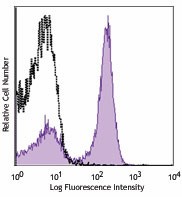
-

C57BL/6 mouse splenocytes were stained with CD40 (clone 3/23) PerCP/Cyanine5.5 (filled histogram) or rat IgG2a, κ PerCP/Cyanine5.5 isotype control (open histogram).
| Cat # | Size | Price | Quantity Check Availability | Save | ||
|---|---|---|---|---|---|---|
| 124623 | 25 µg | 100€ | ||||
| 124624 | 100 µg | 287€ | ||||
CD40 is a 48 kD type I transmembrane glycoprotein also known as Bp50. It is a member of the tumor necrosis factor receptor (TNFR) superfamily and is expressed on B cells, basal epithelial cells, macrophages, follicular dendritic cells, endothelial cells, and a subset of CD34+ hematopoietic progenitors. CD40 regulates B cell development/maturation, Ig isotype switching and, in combination with other signals such as IL-4, protects B cells from surface Ig-induced apoptosis and promotes proliferation. Interaction of CD40 with its ligand CD154 (gp39), which is expressed on activated T cells, is important in costimulation and immune regulation.
Product DetailsProduct Details
- Verified Reactivity
- Mouse
- Antibody Type
- Monoclonal
- Host Species
- Rat
- Immunogen
- Recombinant mouse CD40 protein
- Formulation
- Phosphate-buffered solution, pH 7.2, containing 0.09% sodium azide.
- Preparation
- The antibody was purified by affinity chromatography and conjugated with PerCP/Cyanine5.5 under optimal conditions.
- Concentration
- 0.2 mg/ml
- Storage & Handling
- The antibody solution should be stored undiluted between 2°C and 8°C, and protected from prolonged exposure to light. Do not freeze.
- Application
-
FC - Quality tested
- Recommended Usage
-
Each lot of this antibody is quality control tested by immunofluorescent staining with flow cytometric analysis. For flow cytometric staining, the suggested use of this reagent is ≤1.0 µg per million cells in 100 µl volume. It is recommended that the reagent be titrated for optimal performance for each application.
* PerCP/Cyanine5.5 has a maximum absorption of 482 nm and a maximum emission of 690 nm. - Application Notes
-
For highly sensitive assays, we recommend Ultra-LEAF™ purified antibody (Cat. No. 124627 &124628) with a low endotoxin limit (Endotoxin < 0.01 EU/µg).
- Application References
-
- Hasbold J, et al. 1994. Eur. J. Immunol. 24:1835.
- Bourgeois C, et al. 2002. Science 297:2060.
- Product Citations
-
- RRID
-
AB_2561473 (BioLegend Cat. No. 124623)
AB_2561474 (BioLegend Cat. No. 124624)
Antigen Details
- Structure
- 48 kD type I transmembrane glycoprotein, a member of the tumor necrosis factor receptor (TNFR) superfamily.
- Distribution
-
Expressed on B lymphocytes and other antigen-presenting cells, such as macrophages, follicular dendritic cells, etc.
- Function
- Regulates B cell growth and differentiation and Ig isotype switching. Interaction of CD40 with its ligand, CD154, on activated T cells is important for immune response.
- Ligand/Receptor
- CD154 on T cells
- Cell Type
- Antigen-presenting cells, B cells, Dendritic cells, Macrophages
- Biology Area
- Cell Biology, Costimulatory Molecules, Immunology, Neuroscience, Neuroscience Cell Markers
- Molecular Family
- CD Molecules
- Antigen References
-
1. Grewal IS, et al. 1998. Annu Rev Immunol 16:111.
- Gene ID
- 21939 View all products for this Gene ID
- Specificity (DOES NOT SHOW ON TDS):
- CD40
- Specificity Alt (DOES NOT SHOW ON TDS):
- CD40
- App Abbreviation (DOES NOT SHOW ON TDS):
- FC
- Hidden Names (DOES NOT SHOW ON TDS):
- B Cell, Myeloid Dendritic Cell, Plasmacytoid Dendritic Cell, Astrocyte
- UniProt
- View information about CD40 on UniProt.org
Related FAQs
- How stable is PerCP/Cyanine5.5 tandem as compared to PerCP alone?
-
PerCP/Cyanine5.5 is quite photostable and also better than PerCP alone in withstanding fixation.
Other Formats
View All CD40 Reagents Request Custom Conjugation| Description | Clone | Applications |
|---|---|---|
| Purified anti-mouse CD40 | 3/23 | FC,IHC-F |
| Biotin anti-mouse CD40 | 3/23 | FC |
| FITC anti-mouse CD40 | 3/23 | FC |
| PE anti-mouse CD40 | 3/23 | FC |
| APC anti-mouse CD40 | 3/23 | FC |
| Alexa Fluor® 647 anti-mouse CD40 | 3/23 | FC |
| PE/Cyanine5 anti-mouse CD40 | 3/23 | FC |
| PE/Cyanine7 anti-mouse CD40 | 3/23 | FC |
| Ultra-LEAF™ Purified anti-mouse CD40 | 3/23 | FC |
| PerCP/Cyanine5.5 anti-mouse CD40 | 3/23 | FC |
| Pacific Blue™ anti-mouse CD40 | 3/23 | FC |
| PE/Dazzle™ 594 anti-mouse CD40 | 3/23 | FC |
| APC/Fire™ 750 anti-mouse CD40 | 3/23 | FC |
| TotalSeq™-C0903 anti-mouse CD40 | 3/23 | PG |
| TotalSeq™-A0903 anti-mouse CD40 | 3/23 | PG |
| APC/Cyanine7 anti-mouse CD40 | 3/23 | FC |
| TotalSeq™-B0903 anti-mouse CD40 Antibody | 3/23 | PG |
| Brilliant Violet 421™ anti-mouse CD40 | 3/23 | FC |
| Brilliant Violet 650™ anti-mouse CD40 | 3/23 | FC |
| Brilliant Violet 785™ anti-mouse CD40 | 3/23 | FC |
Customers Also Purchased
Compare Data Across All Formats
This data display is provided for general comparisons between formats.
Your actual data may vary due to variations in samples, target cells, instruments and their settings, staining conditions, and other factors.
If you need assistance with selecting the best format contact our expert technical support team.
-
Purified anti-mouse CD40
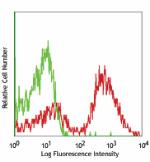
BALB/c mouse splenocytes stained with purified 3/23, followe... 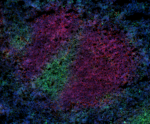
Balb/C mouse frozen spleen tissue slices were fixed with 4% ... -
Biotin anti-mouse CD40
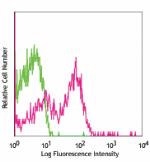
BALB/c splenocytes stained with biotinylated 3/23, followed ... -
FITC anti-mouse CD40
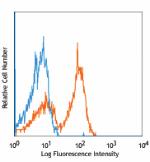
BALB/c splenocytes stained with 3/23 FITC -
PE anti-mouse CD40
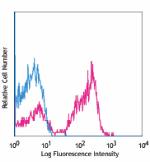
BALB/c splenocytes stained with 3/23 PE -
APC anti-mouse CD40
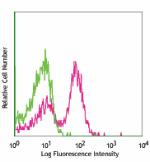
BALB/c splenocytes stained with 3/23 APC -
Alexa Fluor® 647 anti-mouse CD40
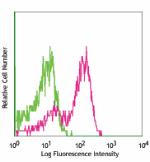
BALB/c splenocytes stained with 3/23 Alexa Fluor® 647 -
PE/Cyanine5 anti-mouse CD40
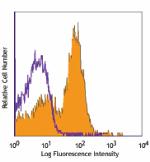
C57BL/6 splenocytes stained with 3/23 PE/Cyanine5 -
PE/Cyanine7 anti-mouse CD40
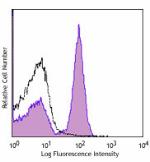
BALB/c splenocytes stained with CD40 (clone 3/23) PE/Cyanine... -
Ultra-LEAF™ Purified anti-mouse CD40
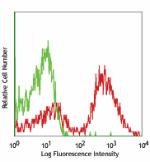
BALB/c mouse splenocytes stained with Ultra-LEAF™ purified C... -
PerCP/Cyanine5.5 anti-mouse CD40
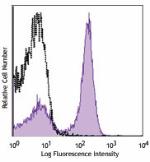
C57BL/6 mouse splenocytes were stained with CD40 (clone 3/23... -
Pacific Blue™ anti-mouse CD40
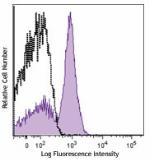
C57BL/6 mouse splenocytes were stained with CD40 (clone 3/23... -
PE/Dazzle™ 594 anti-mouse CD40
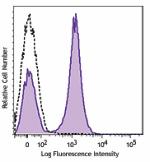
C57BL/6 mouse splenocytes were stained with CD40 (clone 3/23... -
APC/Fire™ 750 anti-mouse CD40
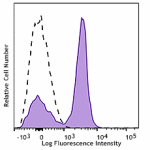
C57BL/6 mouse splenocytes were stained with CD40 (clone 3/23... -
TotalSeq™-C0903 anti-mouse CD40
-
TotalSeq™-A0903 anti-mouse CD40
-
APC/Cyanine7 anti-mouse CD40
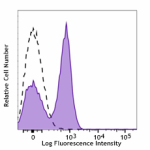
C57BL/6 mouse splenocytes were stained with CD40 (clone 3/23... -
TotalSeq™-B0903 anti-mouse CD40 Antibody
-
Brilliant Violet 421™ anti-mouse CD40

C57BL/6 mouse splenocytes were stained with anti-mouse CD19 ... -
Brilliant Violet 650™ anti-mouse CD40

C57BL/6 mouse splenocytes were stained with anti-mouse CD19 ... -
Brilliant Violet 785™ anti-mouse CD40

C57BL/6 mouse splenocytes were stained with anti-mouse CD19 ...
 Login / Register
Login / Register 










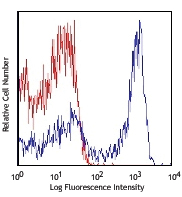
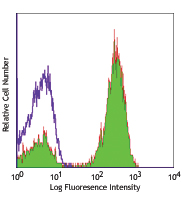
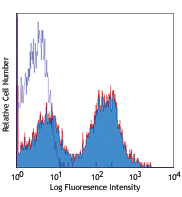
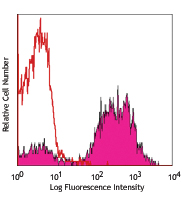



Follow Us